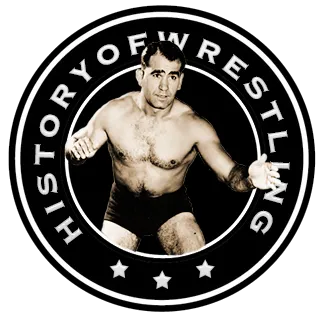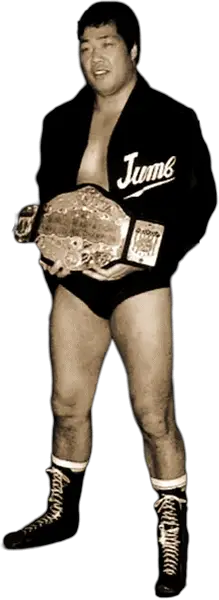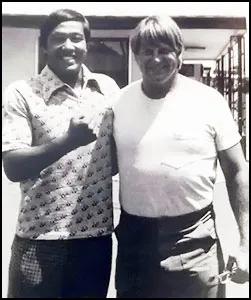by Stephen Von Slagle
Jumbo Tsuruta, the rugged and ultra-talented three hundred pound shooter was, in terms of championship reigns, easily one of the most successful wrestlers in Japanese history. However, in terms of ringwork, the ahead-of-his-time former Olympian was legitimately in a league of his own, and he was the innovator of many moves that are now common in professional wrestling. Additionally, Tsuruta introduced the highly realistic, believable and punishing “strong” style of competition that eventually became synonymous with Shohei Baba’s All Japan Pro Wrestling, thus altering the sport forever in the Land of the Rising Sun.
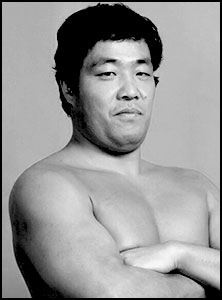 Tomomi “Jumbo” Tsuruta was born on March 25, 1951 in Makioka, Japan and after excelling at both wrestling and basketball while in college, he made his debut as a professional wrestler in 1973. Just prior to turning pro, Tsuruta became a well known sports hero in his native land by competing on the Japanese national Greco-Roman team and the 6’5″ 300 lb. pounder even placed seventh in the super-heavyweight division during the 1972 Olympic games in Munich. So, when it was announced early in 1973 that Tsuruta had signed a contract with Shohei “Giant” Baba’s fledgling All Japan Pro Wrestling group, the news made national headlines in Japanese sports circles. The potential-filled young grappler had some workouts with the legendary masked man known as The Destroyer (Dick Beyer) and was then promptly sent by Baba to Amarillo, Texas in order to be personally trained by the reigning World Heavyweight champion at the time, Dory Funk, Jr. and his brother Terry. The talented Tsuruta was a quick study, and after his initial training by the Funk brothers, he debuted in the Amarillo territory as Tommy Tsuruta.
Tomomi “Jumbo” Tsuruta was born on March 25, 1951 in Makioka, Japan and after excelling at both wrestling and basketball while in college, he made his debut as a professional wrestler in 1973. Just prior to turning pro, Tsuruta became a well known sports hero in his native land by competing on the Japanese national Greco-Roman team and the 6’5″ 300 lb. pounder even placed seventh in the super-heavyweight division during the 1972 Olympic games in Munich. So, when it was announced early in 1973 that Tsuruta had signed a contract with Shohei “Giant” Baba’s fledgling All Japan Pro Wrestling group, the news made national headlines in Japanese sports circles. The potential-filled young grappler had some workouts with the legendary masked man known as The Destroyer (Dick Beyer) and was then promptly sent by Baba to Amarillo, Texas in order to be personally trained by the reigning World Heavyweight champion at the time, Dory Funk, Jr. and his brother Terry. The talented Tsuruta was a quick study, and after his initial training by the Funk brothers, he debuted in the Amarillo territory as Tommy Tsuruta.
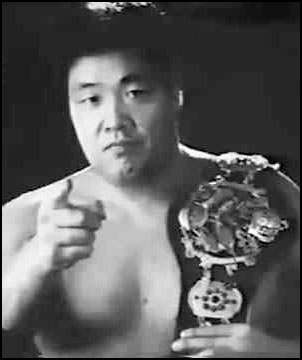 Even though the war between the United States and Japan had ended some thirty years earlier, Japanese wrestlers who toured America in the early Seventies were still cast in very stereotypical roles by the promoters of the day, as was also the case for Americans working in Japan.. However, the young and athletic Tsuruta managed to avoid being typecast and he actually became quite popular with the Texas fans during his six months in the region. After only a handful of professional matches to his credit, the spectacular rookie wrestled a classic 2 out of 3 Falls match against the NWA World Heavyweight champion Dory Funk, Jr. and even took one of the falls from the respected champion during their match-up. Once Tsuruta’s initial training was completed, he was ready to return home and begin wrestling for All Japan, which turned out to be the only Japanese wrestling promotion that he ever competed for during his storied twenty-six years in the ring.
Even though the war between the United States and Japan had ended some thirty years earlier, Japanese wrestlers who toured America in the early Seventies were still cast in very stereotypical roles by the promoters of the day, as was also the case for Americans working in Japan.. However, the young and athletic Tsuruta managed to avoid being typecast and he actually became quite popular with the Texas fans during his six months in the region. After only a handful of professional matches to his credit, the spectacular rookie wrestled a classic 2 out of 3 Falls match against the NWA World Heavyweight champion Dory Funk, Jr. and even took one of the falls from the respected champion during their match-up. Once Tsuruta’s initial training was completed, he was ready to return home and begin wrestling for All Japan, which turned out to be the only Japanese wrestling promotion that he ever competed for during his storied twenty-six years in the ring.
Jumbo made his AJPW debut on September 6, 1973, defeating the disliked gai-jin Moose Morowski at a AJPW television taping. Immediately upon his debut, Tsuruta was pushed as the protégé of Giant Baba and their team was one of the most successful in Japanese wrestling history, both in the ring and in the AJPW offices. Together, the duo of Baba & Tsuruta enjoyed no less than six separate reigns as the NWA International Tag Team champions between 1975-1983, as well as capturing the NWA World Tag Team title (Detroit version) in 1980. While the more experienced and well-known Baba was the clear leader of the towering duo, it was the talented, powerful and skilled Tsuruta who was invariably the team’s MVP. Baba and Tsuruta worked together in All Japan for more than a quarter-century all total and in addition to their partnership being one of the longest lasting, their inspired business relationship was also one of the wrestling business’ most prosperous. Still, despite all of the success he had with Baba in the ring, Tsuruta also formed several other championship caliber teams.
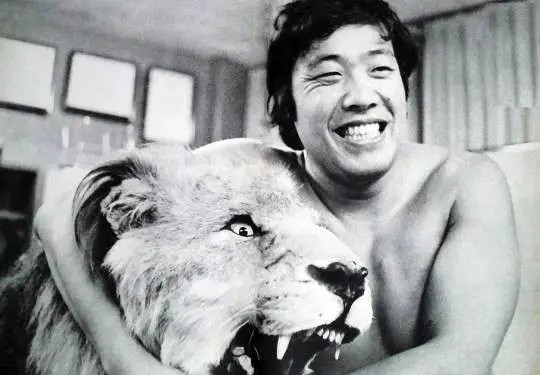 In July of 1987, Tsuruta teamed with Tiger Mask (Mitsuhara Misawa) to defeat Stan Hansen & Ted Dibiase for the PWF Tag Team title. Later, Jumbo Tsuruta would also team with The Great Kabuki and, later, Akira Taue to win the prestigious PWF Tag Team championship. However, aside from Baba, Jumbo’s primary partner was, much like himself, a talented and hard-hitting former Olympian by the name of Yoshiaki Yatsu. The highly skilled and very popular duo of Tsuruta & Yatsu won five separate PWF Tag Team championships together and then, on June 10, 1988, they defeated the reigning NWA International Tag Team champions, The Road Warriors, to unify the two titles into AJPW’s first World Tag team championship. Yet, in addition to wrestling as part of several very successful teams, Tsuruta also excelled as a singles competitor, and, in terms of perceived stature within AJPW, he was perhaps second only to All-Japan founder Shohei Baba in the eyes of the fans. Not surprisingly, he wrestled in main-event title matches against NWA World champions such Dory Funk, Jack Brisco, Terry Funk, Harley Race and Ric Flair, competing against essentially every NWA champion throughout the Seventies and Eighties.
In July of 1987, Tsuruta teamed with Tiger Mask (Mitsuhara Misawa) to defeat Stan Hansen & Ted Dibiase for the PWF Tag Team title. Later, Jumbo Tsuruta would also team with The Great Kabuki and, later, Akira Taue to win the prestigious PWF Tag Team championship. However, aside from Baba, Jumbo’s primary partner was, much like himself, a talented and hard-hitting former Olympian by the name of Yoshiaki Yatsu. The highly skilled and very popular duo of Tsuruta & Yatsu won five separate PWF Tag Team championships together and then, on June 10, 1988, they defeated the reigning NWA International Tag Team champions, The Road Warriors, to unify the two titles into AJPW’s first World Tag team championship. Yet, in addition to wrestling as part of several very successful teams, Tsuruta also excelled as a singles competitor, and, in terms of perceived stature within AJPW, he was perhaps second only to All-Japan founder Shohei Baba in the eyes of the fans. Not surprisingly, he wrestled in main-event title matches against NWA World champions such Dory Funk, Jack Brisco, Terry Funk, Harley Race and Ric Flair, competing against essentially every NWA champion throughout the Seventies and Eighties.
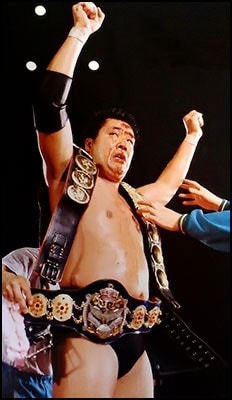 In August of 1976, AJPW presented a tournament to crown the first All-Japan United National champion. The United National title had actually been part of the old JWA, and was being revived by All Japan as one of the most prestigious championships in the company. On August 28, Tsuruta added to his growing aura by defeating U.S. representative (and former World champion) Jack Brisco to become the new United National champ and the first-ever U.N. titleholder in All-Japan history. In all, Jumbo Tsuruta would go on to hold the United National title six different times between 1976-1983, defeating the likes of Billy Robinson, Dick Murdoch, Abdullah the Butcher and Harley Race to win the coveted championship. Another major AJPW title that the nearly undefeatable Tsuruta held with an ironclad grip was the International Heavyweight championship. Over the course of his three reigns as the International champion, he carried the title for more than four and a half years. Then, when Tsuruta, the reigning United National & International Heavyweight champion defeated P.W.F. titleholder Stan Hansen on April 18, 1988, the Triple Crown championship was born with Tsuruta serving as the first-ever unified Japanese champion.
In August of 1976, AJPW presented a tournament to crown the first All-Japan United National champion. The United National title had actually been part of the old JWA, and was being revived by All Japan as one of the most prestigious championships in the company. On August 28, Tsuruta added to his growing aura by defeating U.S. representative (and former World champion) Jack Brisco to become the new United National champ and the first-ever U.N. titleholder in All-Japan history. In all, Jumbo Tsuruta would go on to hold the United National title six different times between 1976-1983, defeating the likes of Billy Robinson, Dick Murdoch, Abdullah the Butcher and Harley Race to win the coveted championship. Another major AJPW title that the nearly undefeatable Tsuruta held with an ironclad grip was the International Heavyweight championship. Over the course of his three reigns as the International champion, he carried the title for more than four and a half years. Then, when Tsuruta, the reigning United National & International Heavyweight champion defeated P.W.F. titleholder Stan Hansen on April 18, 1988, the Triple Crown championship was born with Tsuruta serving as the first-ever unified Japanese champion.
Tsuruta proudly defended his unified World championship for the next several months, before being upset by his bitter rival Genichiro Tenryu in June of `89. However, the popular Tsuruta would regain the Triple Crown from Tenryu the following September. He then held the championship for eight months before losing to Terry “Bam Bam” Gordy on June 5, 1990. Jumbo Tsuruta’s final reign as the unified Triple Crown champion came when he defeated longtime rival Stan “The Lariat” Hansen on January 19, 1991. After holding the highly prestigious unified championship (which was considered by most Japanese observers to be even more important than the New Japan version of the World title) for more than a full year, Tsuruta lost the three belts that formed the unified championship back to Hansen, which ultimately marked the end of his association with the Triple Crown.
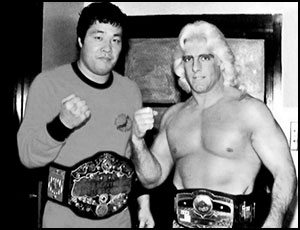 In America, Jumbo Tsuruta is probably best remembered for his victory over hated AWA World Heavyweight champion Nick Bockwinkel on February 22, 1984. Although he won the AWA World title in Tokyo, Tsuruta defended the championship frequently in AWA cities throughout the United States in addition to putting his title on the line against Japanese competition. While he was not the most marketable champion (certainly not when compared to the NWA’s Ric Flair or the WWF’s Hulk Hogan) the AWA was nevertheless able to exploit Tsuruta’s stiff ring style and present him as a legitimately dangerous, yet honorable, world-class competitor who was completely deserving of holding the World championship. After three successful months as the AWA World champion, the highly credible Tsuruta delivered the title to the promotion’s most popular young babyface, Rick Martel, on May 13, 1984.
In America, Jumbo Tsuruta is probably best remembered for his victory over hated AWA World Heavyweight champion Nick Bockwinkel on February 22, 1984. Although he won the AWA World title in Tokyo, Tsuruta defended the championship frequently in AWA cities throughout the United States in addition to putting his title on the line against Japanese competition. While he was not the most marketable champion (certainly not when compared to the NWA’s Ric Flair or the WWF’s Hulk Hogan) the AWA was nevertheless able to exploit Tsuruta’s stiff ring style and present him as a legitimately dangerous, yet honorable, world-class competitor who was completely deserving of holding the World championship. After three successful months as the AWA World champion, the highly credible Tsuruta delivered the title to the promotion’s most popular young babyface, Rick Martel, on May 13, 1984.
While it is certainly true that Tsuruta was a huge fan favorite both at home and in the States, as well as being one of the most honorable and hard-working performers in the business, it’s also true that for a short time during the early Nineties, Jumbo Tsuruta experimented with a much more heelish persona. Far from a run-of-the-mill ‘bad guy’ who would cower in fear or accept tainted victories, Tsuruta’s new attitude and ring demeanor was basically an extension of his hard-hitting, punishing and merciless ring style. Adding to his ‘heel turn’ was the fact that instead of continuing to wrestle against Hansen, Abdullah and the rest of the hated gai-jins or his many Japanese rivals, Tsuruta started competing against AJPW’s most popular young up-and-comers. Tsuruta was now in a what seemed to be a permanently bad mood, and the gruff, stern taskmaster began battering and bruising his less experienced opponents without remorse, seemingly enjoying the psychological rush of dominating talented athletes who were frequently half his age.
However, the true reason behind his heel turn was simply to build new young babyfaces to carry on the popularity and tradition of All Japan Pro Wrestling. At the time, Baba’s respected company was experiencing a serious lack of money-drawing young talent at the top of the card, a situation that was allowing Inoki’s New Japan Pro Wrestling to make effective strides towards overtaking All Japan in terms of the ongoing AJPW vs. NJPW promotional battle. As the premier AJPW competitor, Tsuruta’s matches carried an enormous amount of prestige and media attention and, by extension, his opponents were almost automatically considered by the fans to be on the top tier of the promotion and legitimate superstars. Given the fact that he lost very, very few matches during his prime as AJPW’s number one performer, merely competing against the great Tsuruta was enough to raise the perceived status of a wrestler. As far as defeating Tsuruta goes, those select few who were able to do the nearly impossible and hold Jumbo’s shoulders down for a rare three-count were rewarded with career-long respect from the loyal Japanese wrestling audience. A perfect example of Tsuruta’s clout with the fans was his famous match with heretofore mid-carder Mitsuhara Misawa. Misawa (who had actually won the P.W.F. Tag Team title several years earlier with Tsuruta while competing as Tiger Mask) was a fine talent and the AJPW brass knew that he had the skill and charisma to become a superstar, but he could never quite make it past the middle of the All Japan roster. That is, until he came up against Jumbo Tsuruta. After defeating the promotion’s (and some would say the world’s) best wrestler, Misawa immediately became the top attraction in AJPW, a position he enjoyed for several years to come.
However, soon after passing the torch to Misawa, Tsuruta was diagnosed with hepatitis. Although he continued to wrestle a full schedule of matches, the disease eventually took its toll on the mighty Tsuruta and both his ring work & appearance clearly suffered. Sadly, he was soon reduced to relatively meaningless, non-title matches with his old tag team partner Giant Baba. Yet, unlike during their previous runs together, this time around it was Baba who was carrying the load of the team, not vice versa. Yet, despite his marked decline in size and ring proficiency, the fans still held a special place in the hearts for the once-great performer and they would cheer passionately whenever Jumbo, after delivering his famous flying knee, would raise his fist into the air, a trademark gesture of Tsuruta’s.
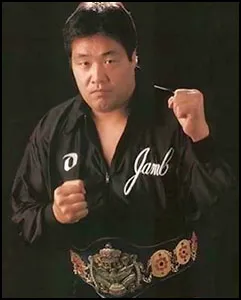 Jumbo Tsuruta retired in the Spring of 1999 and was the recipient of numerous awards presented by Tokyo Sports, including Wrestler of the Year (in 1983, 1984 and 1991), Tag Team of the Year six times (three with longtime partner Shohei Baba), Match of the Year seven times and a Lifetime Achievement award in 2000. He is also a member of the Wrestling Observer Newsletter Hall of Fame (1996) and the Professional Wrestling Hall of Fame (2015)
Jumbo Tsuruta retired in the Spring of 1999 and was the recipient of numerous awards presented by Tokyo Sports, including Wrestler of the Year (in 1983, 1984 and 1991), Tag Team of the Year six times (three with longtime partner Shohei Baba), Match of the Year seven times and a Lifetime Achievement award in 2000. He is also a member of the Wrestling Observer Newsletter Hall of Fame (1996) and the Professional Wrestling Hall of Fame (2015)
Following complications from a liver transplant, Tomomi “Jumbo” Tsuruta passed away on May 13, 2000 at the age of 49.
